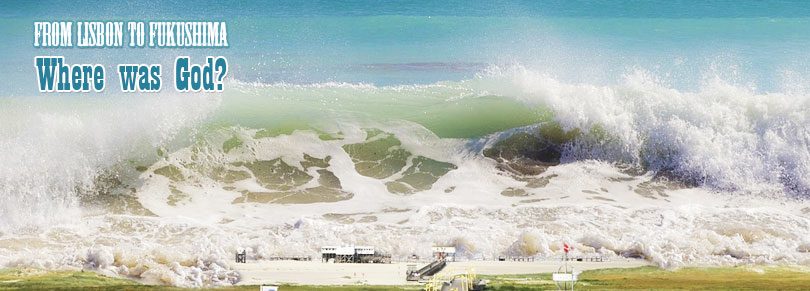I said that we should refrain from making these sweeping statements as indeed even the Roman Catholic bishop died. Surely if Christians were immune to disease and destruction, or only the voodoo practitioners were affected, one could make a reasonable case for the statement.
Six years ago, William Safire wrote in the New York Times an article titled ‘Where was God’, about why an omnipotent and all-loving God allows such tragedies as the tsunami in Southeast Asia. When these natural catastrophes strike, people of every stripe pick up their worldview and try to see if it holds water. Safire brought up the story of Job and his many sufferings, found in the Bible.
|
Job was a just and good man, who always strove to please God throughout his life. The Lord rewarded him for his piety with great wealth and a large family. But the Devil was jealous of Job and wanted to test his faith. God, in order to reveal to all how faithful Job was to Him and in order to teach people patience in their sufferings, permitted the Devil to test him. His cattle was driven away, his servants were killed, a terrible tornado killed all his children and Job was stricken with the most terrible disease — leprosy. Through all this Job not only did not complain against God, but he said, “God gave, and God has taken away, blessed be the name of the Lord.” God rewarded His faithful servant. Job regained his health. He had more sons and daughters, gained back twice as much as he had before, and lived another one hundred and forty years in honor, quietly, piously and happily. |
Safire astutely wrote that “…suffering is not evidence of sin. When Job’s friends said that he must have done something awful to deserve such misery, the reader knows that is false. Job’s suffering was a test of his faith…” Safire also mentions in the article that Virginia Woolf once wrote in her journal “I read the Book of Job last night – I don’t think God comes well out of it.” In 1755, an earthquake and the following tsunami devastated the city of Lisbon, Portugal.
It raised the central question of how evil and suffering in the world can be reconciled with the goodness of God. The French philosopher Voltaire wrote ‘Candide’ to give his answer to the problem. The 1883 volcanic eruption destroyed the tiny island of Krakatoa, in the Dutch East Indies (modern day Indonesia). Some 42,000 people died, and the local Muslim population promptly sought to placate Allah for his wrath.
In 1906, a Preacher in Los Angeles, uttered from his pulpit that the Lord would deal with San Francisco, which had become depraved. As Simon Winchester writing about this in The Wall Street Journal puts it, ‘A mighty blow from the sky would destroy the city, a mark of God’s vehement disapproval. Two days after his sermon, just before dawn, the San Andreas Fault shuddered and brought San Francisco to its knees.’
The 1976 Tangshan earthquake destroyed the coal-mining city in northern China, with a vast death toll of over 250,000 and was widely seen as indicating God’s dismay at the behaviour of the Chinese Communist Party and the excesses of the Red Guards. Let’s be very clear about a couple of things. It is possible for example that God did let the preacher on to something impending. I for one do not know one way or the other.
However, if Winchester’s words accurately capture what the preacher said, then I am not sure how an earthquake equates to a ‘mighty blow from the sky.’ That would have been more like a tornado or a hurricane. Secondly, I believe it is far too simplistic to attribute the tragedy of natural disasters to certain people groups and practices. The mullahs of the East Indies preached the presence of Christians had angered Allah, who brought about the volcano as punishment.
One wonders then why Holland was spared and the Indies destroyed? In the ensuing riots that were fomented, large numbers of Dutchmen and their families were slaughtered by Muslims, as Simon Winchester writes, ‘flying banners inscribed with the seismic battle-cry of “Krakatoa!”’ Again one wonders about the Tangshan earthquake – if God’s hand was directly involved to express His displeasure over the communist party’s activities, why were the victims not the Red Guards or the leaders of the Communist party, but the poor victims of the party’s crimes? It would seem that the common man was getting a double dose of injustice.
| Now I believe that God clearly has a hand in all these, for nothing happens in this universe without His permitting it. If one were to talk about the San Francisco earthquake as being attributed to the 800 mile long San Andreas fault, that explanation talks only in terms of material and efficient causes and it betrays a naturalistic world view. |
The first question I ask myself as I come across these calamities is ‘is it wrong for God to take away the life of human beings, and that – sinful human beings?’ I conclude that if He is the Author of life, since He has the ability to give life, surely He must have the right to take it away as well. The prerogative to do as He wills with a creation always remains with the person who created and sustains an object (just as an author of an article or book has the prerogative to write, rewrite or tear apart the fruit of his own labour).
I then consider that if He – as the Author – has the right to end a human being’s life, he must also have the right to take it away, using any means possible. After all, He does take the life of people away every day. Most are by ‘natural’ means of old age and disease – things we expect and accept – and yes, individually (not in hordes). As individual death is routine, we see or hear about this on a daily basis.
We do not pause to question His authority to take the lives of individuals. Since He chose to take away so many lives in one fell swoop, we are in some sense filled with moral outrage. I have to ask myself the question ‘what is it about a tsunami, an earthquake, a volcano or the number of people that makes it unjust for God to choose those as means to His end?’ Doesn’t God have the prerogative to do as He wills and pleases?
What is frustrating for us ‘mere mortals’ is that we are not privy to His intentions and motives. We expect a night’s perusal – as did Ms. Woolf – to give us a comprehensive picture of His infinite nature. I put that effort as akin to my son – a kindergartner – vaguely familiar with arithmetic, dismissing calculus as folly. And perhaps that is what Job’s God is hinting at. While you are a morally upright man Job, you are still finite.
How do you expect to understand the nuances of My motives and intentions to test and purify you – to make you more like Me – and to hold you up to future generations as a beacon of tenacity so that they may find solace in distress…and maybe even have a model to emulate – if you do not understand Me first as your and every other creature’s Creator? Nevertheless, the question still persists as to why ‘the innocent’ (at least to us) suffer thus?
With that, we assume that when a person dies, he ceases to exist, and is therefore unjustly lost to us forever. Not so. The illustration that best helps me envision death is that of a parent who takes his exhausted and wounded child away from the playground court and into the house so that he may wash him, dress the wound, have him rest and be rejuvenated. As the door gets shut, the friends – who are still outside – are sad that they cannot continue to play with him and enjoy his company – till he is well again.
Likewise, when an innocent or righteous person is ‘taken away,’ his friends will get to see him again. Just not till their time comes. What should my attitude be when I come across such calamities? All disease and destruction needs to be understood in some form as God’s punishment of a desperately fallen and sinful world. But His mercy is far more on display most of the time everywhere. If not, I believe we would be perpetually experiencing every calamity – for my sins deserve them.
So the Zen Buddhist Japanese or the voodoo worshipping Haitians are not worse sinners than me. Given the light I have, when these disasters occur in other parts of the world, I need to repent and pray for my life – that I will sit before God and get to know Him more and therefore fall in love with Him more – and to reflect His truth and grace toward me, wisely. I need to understand that He may choose to take me away any which way that pleases Him, and that I am sustained by Him till the time He decides to call me to Himself.
Therefore, I cannot but quote the psalmist who says it more eloquently than I can “If God had not been on our side ….the flood would have engulfed us, the torrent would have swept over us, the raging waters would have swept us away.”





